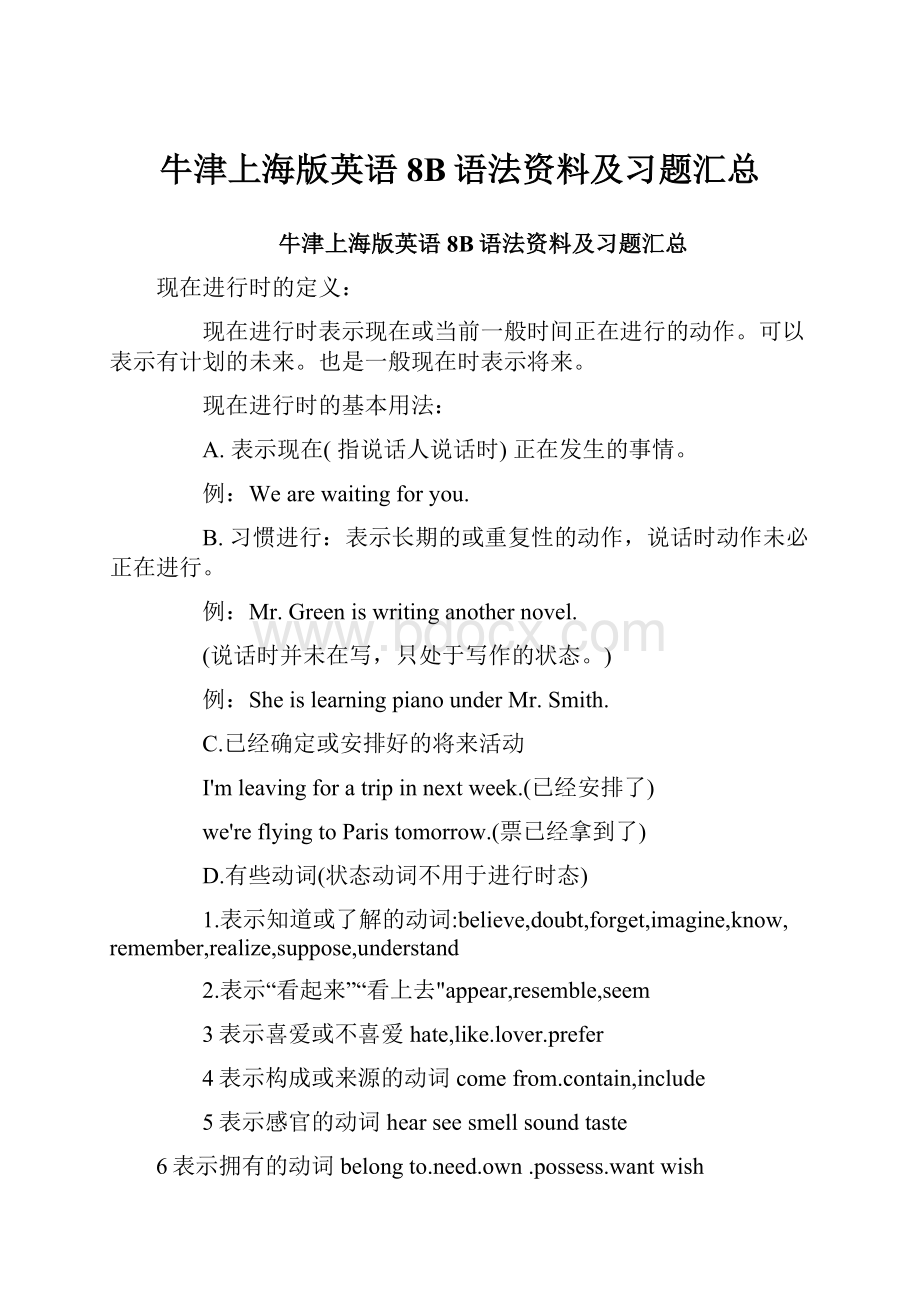牛津上海版英语8B语法资料及习题汇总.docx
《牛津上海版英语8B语法资料及习题汇总.docx》由会员分享,可在线阅读,更多相关《牛津上海版英语8B语法资料及习题汇总.docx(48页珍藏版)》请在冰豆网上搜索。

牛津上海版英语8B语法资料及习题汇总
牛津上海版英语8B语法资料及习题汇总
现在进行时的定义:
现在进行时表示现在或当前一般时间正在进行的动作。
可以表示有计划的未来。
也是一般现在时表示将来。
现在进行时的基本用法:
A.表示现在(指说话人说话时)正在发生的事情。
例:
Wearewaitingforyou.
B.习惯进行:
表示长期的或重复性的动作,说话时动作未必正在进行。
例:
Mr.Greeniswritinganothernovel.
(说话时并未在写,只处于写作的状态。
)
例:
SheislearningpianounderMr.Smith.
C.已经确定或安排好的将来活动
I'mleavingforatripinnextweek.(已经安排了)
we'reflyingtoParistomorrow.(票已经拿到了)
D.有些动词(状态动词不用于进行时态)
1.表示知道或了解的动词:
believe,doubt,forget,imagine,know,remember,realize,suppose,understand
2.表示“看起来”“看上去"appear,resemble,seem
3表示喜爱或不喜爱hate,like.lover.prefer
4表示构成或来源的动词comefrom.contain,include
5表示感官的动词hearseesmellsoundtaste
6表示拥有的动词belongto.need.own.possess.wantwish
E.表示渐变的动词有:
get,grow,become,turn,run,go,begin等。
例:
Theleavesareturningred.
It'sgettingwarmerandwarmer.
F.与always,constantly,forever等词连用,表示反复发生的动作或持续存在的状态,往往带有说话人的主观色彩。
例:
Youarealwayschangingyourmind.
【No.1】现在进行时的构成
现在进行时由"be+v-ing"构成。
be应为助动词,初学者最容易漏掉,它应与主语的人称和数保持一致。
【No.2】现在进行时的应用
在实际运用时,现在进行时常用以下几种情况:
(1)当句子中有now时,常表示动作正在进行,这时要用现在进行时。
如:
Theyareplayingbasketballnow.现在他们正在打篮球。
(2)以look,listen开头的句子,提示我们动作正进行,这时要用现在进行时。
如:
Listen!
SheissinginganEnglishsong.听,她正在唱英语歌。
(3)表示当前一段时间或现阶段正在进行的动作,且此时有thisweek,thesedays等时间状语,这时常用现在进行时。
如:
Wearemakingmodelplanesthesedays.这些天我们在做飞机模型。
(4)描述图片中的人物的动作,也为了表达更生动。
此时也常用现在进行时。
如:
Lookatthepicture.Thechildrenareflyingkitesinthepark.看这幅图,那些孩子正在公园放风筝。
【No.3】现在进行时的变化
肯定句式:
主语+be(am,is,are)+现在分词+其它.
否定句式:
主语+be(am,is,are)+not+现在分词+其它.
一般疑问句:
Be(am,is,are)+主语+现在分词+其它?
特殊疑问句:
疑问词+be(am,is,are)+主语+现在分词+其它?
对现在进行时的特殊疑问句的回答,它不可以用Yes或No直接作答,要根据实际情况回答。
动词加ing的变化规则
1.一般情况下,直接加ing,如:
cook-cooking
2.以不发音的e结尾,去e加ing,如:
make-making,taste-tasting
3.如果末尾是一个元音字母和一个辅音字母,双写末尾的辅音字母,再加ing,如:
run-running,stop-stopping
用所给的动词的正确形式填空:
1.Theboy__________________(draw)apicturenow.
2.Listen.Somegirls_______________(sing)intheclassroom.
3.Mymother_________________(cook)somenicefoodnow.
4.What_____you______(do)now?
5.Look.They_______________(have)anEnglishlesson.
6.They____________(not,water)theflowersnow.
7.Look!
thegirls________________(dance)intheclassroom.
8.Whatisourgranddaughterdoing?
She_________(listen)tomusic.
9.It’s5o’clocknow.We_____________(have)suppernow
10.______Helen____________(wash)clothes?
Yes,sheis.
三、句型转换:
1.Theyaredoinghousework.(分别改成一般疑问句和否定句)
_____________________________________________________________
_____________________________________________________________
2.Thestudentsarecleaningtheclassroom.(改一般疑问句并作肯定和否定回答)
________________________________________________________________
________________________________________________________________
3.I’mplayingfootballintheplayground.(对划线部分进行提问)
________________________________________________________________
4.Tomisreadingbooksinhisstudy.(对划线部分进行提问)
________________________________________________________________
请判断下列各题空格处动词的正确时态。
1.Youcan'tseehernow;she__________(have)abath.
2.Myparents__________(grow)olderandolder.
3.Heusually__________(drink)coffeebuttodayhe______(drink)tea.
4.Thechildren_____(have)agoodtimeatthepartyverymuchrightnow.
5.A:
How__________(youusuallyget)towork?
B:
Iusually__________(go)bybusbuttomorrowI__________(go)inTom'scar.
6.A:
Why__________(youput)onyourcoat?
B:
I__________(go)forawalk.__________(youcome)withme?
A:
Yes,I'dloveto.__________(Youmind)ifI__________(bring)mydog?
7.Idon'tknowwhatshe__________(talk)about,forshe(speak)toofast.Iamsureifshe__________(speak)slower,Icanunderstandher.
8.She____(like)totalkverymuch.Infactshe(alwaystalkandtalk).
9.We____(use)thisroomtodaybecausethewindowsintheotherroomisbroken.
10.A:
Howareyoutoday?
B:
I__________(feel)muchbettertoday,butIstill__________(have)coughs.
A:
Thenyouhadbettergo__________(to)seethedoctoragain.
B:
Yes.I__________(see)thedoctorthisafternoon.
11.A:
He____(alwayssay)thathe'llquitsmoking,buthe(neverdo)it.
B:
Yes.WheneverI__________(see)him,he__________(smoke).
12.A:
__________(Youwrite)toherthisevening?
B:
Yes,I__________(alwayswrite)toheronherbirthday.__________(Youwant)tosendheranywords?
13.TomandMary__(have)alongconversation.Iwonderwhatthey(talk)about.
14.A:
Thiscan__(make)averystrangenoise.__(Youthink)itisallright?
B:
Oh,thatnoise___(notmatter).Italways___(make)anoiselikethat.
15.A:
__________(Yousee)myhatanywhere?
B:
No,I_______(look)itforyou,too,butI_______(find)itnowhere.
一.句型Itis+adj.+forsb.(ofsb.)todosth.(对事加以评论/对人加以评论)
不定式短语作主语时,常用形式主语it来代替,而真正的主语放在句子的谓语后面。
例如:
Itisdifficultforyoutoreadthroughthisbookaweekorso.
对你来说一星期左右看完这本书有困难。
Itisusefulforyoutolearnhowtousethecomputer.学习使用计算机对你有好处。
Itwasbraveofyoutogointotheburningbuildingtosavethechild.
你冲入火场救那个孩子,真勇敢。
It’snecessaryforustolearnEnglishtoday.现在对我们来讲,学英语非常重要。
二.(a)few和(a)little的用法
1.(a)few用在可数名词n..[C]之前,(a)little用在不可数名词n.[U]之前。
例如:
Hetookafewbiscuits.(afew=several)他拿了几块饼干。
Hetookfewbiscuits.(few=notmany)他拿的饼干不多。
Hetookalittlebutter.(alittle=some)他拿了点黄油。
Hetooklittlebutter.(little=notmuch)他拿的黄油不多。
2.few可由hardlyany或almostno所替代,含否定的意味。
例如:
Thecompositioniswellwritten;ithasfewmistakes.=Thecompositioniswellwritten;ithashardlyanymistakes.这篇作文很好写,几乎没有多少错误。
Fewmencansolveit.=Almostnomencansolveit.几乎没有人能解决它。
3.afew相当于some,several,含肯定的意味。
例如:
Hehasafewfriends.=Hehassomefriends.=Hehasseveralfriends.他有一些朋友。
4.alittle和little之间的差别,就和afew和few的差别一样,只是(a)little修饰不可数名词,表量或程度。
例如:
Hegrowsworse;thereislittlehopeofhisrecovery.他病情恶化了,恢复的希望很小了。
Heisnotmuchbetter,butthereisalittlehope.他病情不是那么好,但是有点希望。
三.其它的数量形容词
1.plentyof,alotof,lotsof都表示许多,修饰复数可数名词或不可数名词。
例如:
Theroomcontainedplentyof/alotof/lotsofstudents.这个房间容纳了许多学生。
(students是复数名词)
Theroomcontainedplentyof/alotof/lotsoffurniture.这个房间容纳了许多家具。
(furniture是不可数名词)
2.agreatdealof,agooddealof,alargequantityof,asmallquantityof,alargeamountof,asmall
amountof均表量,修饰不可数名词。
例如:
Theroomcontainedalargequantityoffurniture.(不可数名词)
Theroomcontainedalargeamountoffurniture.(不可数名词)
Theroomcontainedasmallquantityoffurniture.(不可数名词)
Theroomcontainedasmallamountoffurniture.(不可数名词)
3.anumberof“许多;一些”;agreatnumberof,alargenumberof,agoodnumberof“许多”,修饰复数可数名词,并且要与复数动词连用。
例如:
Anumberofbooksaremissingfromthelibrary.图书馆的许多书丢失了。
Thenumberofbooksfromthelibraryislarge.图书馆的图书数量很大。
[thenumberof+复数名词+单数(be)动词]
Theroomcontainedagreat/large/good/numberofstudents.(复数可数名词)
这个房间容纳了许多学生。
相关练习题
1.—Ifthereare________peopledriving,therewillbe________airpollution.
—Yes,theairwillbefresher.
A.less;lessB.less;fewerC.fewer;fewerD.fewer;less
2.—Shallweleavenow?
—Don’thurry.Westillhave________timeleft.
A.littleB.alittleC.fewD.afew
3.—Wouldyoulikesomemilkinyourtea?
—Yes,please.Butjust________.
A.littleB.alittleC.afewD.few
4.There’s________milkathome.Wehavetobuysomethisafternoon.
A.alittleB.littleC.afewD.few
5.—Oh,dear.Wehave________foodleft.Whatshouldwedo?
—Don’tworry.I’llgoandbuysome.
A.afewB.alittleC.fewD.little
自学练习题
I.根据汉语提示写单词
1.Youshoulddressneatlyand_________.(整洁地)
2.Wewill_______(举行)asportsmeetingnextMonday.
3.They_________(选举)metobethepresidentofthestudents’Unionyesterday.
4.Newspaperremain___________(受欢迎的)becausetheygivethenewsinmoredetailsthaneitherradiosorTVs.
5.Whowonthe_________(竞赛),doyouknow?
II.句型转换
1.Theyworkhardtogetmoremoney.
_______________________theyworkhard?
(就画线部分提问)
2.MymotherwillvisitEnglandnextweek.
____________________yourmothervisitnextweek?
(就画线部分提问)
3.Yououghttobemorecareful.
You________________tobemorecareful.
4.Theyshouldfinishtheirhomeworkfirst.
________________finishtheirhomeworkfirst.(改为一般疑问句)
5.ThematchbetweenChinaandKoreacouldn’tgoonbecauseitwasrainingheavily.
ThematchbetweenChinaandKoreacouldn’tgoon_____________theheavyrain.(改为同义句)
III.选择填空
1.Theyallhave_______.
A.thedifferentideas B.differentideas
C.thedifferentidea D.differentidea
2.Thevisitors_____ourschoolintwodays.
A.cameto B.willcometo C.cometo D.hascometo
3.---____doyouseeafilm?
---Onceaweek.
A.Howfar B.Howlong C.Howsoon D.Howoften
4.Wecanfind_____studentsintheclassroomnow.Theyareplayingontheplayground.
A.much B.few C.alittle D.little
5.Theywanthim_______thechiefspeaker.
A.tobe B.be C.being D.is
6.Youmust_______forthelostbooks.
A.pay B.cost C.spend D.take
7.---Whathappened_______you?
Youdon’tlookfine.
---Ihaveacold.
A.in B.on C.from D.to
8.Youmaygotothepoliceand_______help.
A.ask B.askfor C.asking D.toaskfor
9.Canshedoherhomeworkby______?
A.himself B.ourselves C.herself D.themselves
10.Haveyoufinished_________thepicture?
A.draw B.todraw C.drew D.drawing
情态动词的基本用法
1.情态动词can/could的用法
表示“能力;许可;可能性”等,在口语中可以代替may表示许可,而may比较正式。
could为can的过去式,可以表示语气较委婉,用于否定句中,表示推测,“不可能”之意。
例如:
Manypeoplecanusethecomputernow,butwecouldn’ttenyearsago.
现在许多人能使用电脑,但十年前我们不能